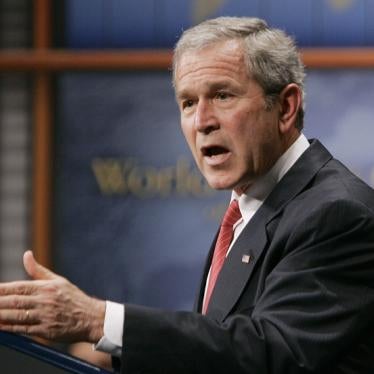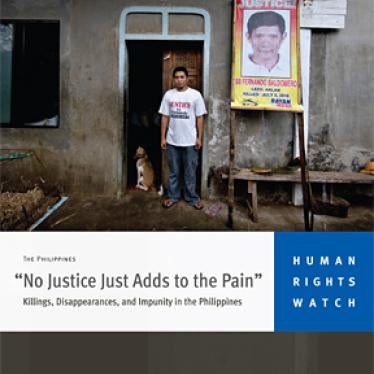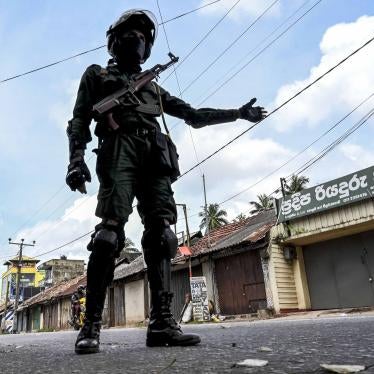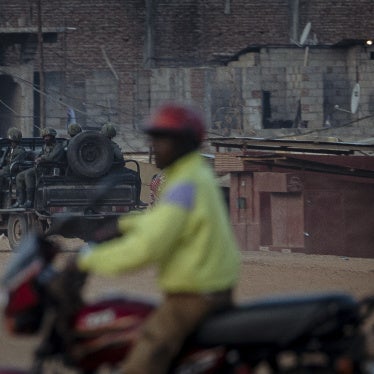Presidents Benigno Aquino III and Barack Obama each entered office with promises to end abuses by their respective country’s security forces. While the abuses, abusers and responses differ, the Aquino and Obama administrations share a common failure. Although the United States has a much better track record than the Philippines for investigating and prosecuting military abuses, neither government has effectively investigated or prosecuted senior government officials responsible for planning and authorizing the abuses.
In July, Human Rights Watch called on the US government to open criminal investigations into allegations of detainee abuse authorized by senior Bush administration officials. The 107-page report, “Getting Away with Torture: The Bush Administration and Mistreatment of Detainees,” presents substantial information warranting criminal investigations of former President George W. Bush, Vice President Dick Cheney, Defense Secretary Donald Rumsfeld, and CIA Director George Tenet, for ordering practices such as “waterboarding,” the use of secret CIA prisons, and the transfer of detainees to countries where they were tortured. Such acts violated the Convention against Torture, the laws of war, and other international treaties binding on the United States.
The Obama administration’s only attempt to look at past abuses has been a wholly insufficient inquiry led by a federal prosecutor, John Durham. It did not investigate the use of interrogation methods that Bush administration lawyers deemed lawful in the now notorious “torture memos,” even though the methods plainly amounted to torture and other illegal acts. Instead, it looked only into cases in which CIA interrogators went beyond what government lawyers authorized, and then only decided to pursue two of about 100 cases it reviewed.
Impunity for serious human rights violations is not acceptable in the US, in the Philippines, or anywhere else. Human rights conventions and the laws of war do not just prohibit abuses, they require officials to investigate and prosecute abuses and provide no exceptions for rank or position. Victims, including the many who we now know committed no crimes but were nevertheless arbitrarily detained and mistreated by the Bush administration, have a right to a remedy and deserve justice. As the Philippines well knows, impunity feeds further abuses.
In the Philippines, President Aquino has condemned human rights violations. There is a new counterinsurgency policy, and a new sign outside the Philippine military’s headquarters that reads, “I am a soldier and a human rights advocate.” But the military continues to be implicated in new killings of leftist activists, farmers and peasants, in horrific incidences of torture—such as the burning and sexual assault of Abdul Khan Ajid in Basilan last month, and in enforced disappearances.
One week after Human Rights Watch published its report on impunity for torture in the US, we published a report on extrajudicial killings in the Philippines since President Aquino took office, “No Justice Just Adds to the Pain: Killings, Disappearances, and Impunity in the Philippines.” It documents seven extrajudicial killings and three enforced disappearances in which there is strong evidence of military involvement.
Curtailing human rights violations requires more than new policies and senior officials committed to reform. Would-be perpetrators need to know that they will go to prison and their careers will end if they order or participate in serious abuses.
Human Rights Watch research reveals that despite the change in government in the Philippines, too often soldiers fail to differentiate between armed members of the communist New People’s Army and leftist activists or people living in conflict-affected communities who, for one reason or another, oppose the military presence but do not directly participate in hostilities. Rather than responding to allegations of abuse with effective internal investigations, disciplinary action, and absolute cooperation with the police, the Commission on Human Rights, and other concerned bodies, the military has responded with absolute denials. And police investigations stall when evidence leads them to the military.
In his first State of the Nation Address in July 2010, the President instructed Justice Secretary Leila de Lima to go forth and prosecute human rights abuses. But he can do much more to push for effective investigations and prosecutions. To combat half-hearted (or nonexistent) police investigations, he should issue an executive order directing police and National Bureau of Investigation investigators to pursue crimes allegedly committed by the military vigorously or to be subject to disciplinary measures themselves. He should communicate fully to all military personnel that all necessary measures will be taken to ensure the safety of officers and soldiers who provide evidence or testimony in cases of human rights violations. And he should order the military’s internal investigators to investigate and report publicly on the involvement of military personnel in extrajudicial killings and to identify failures within military investigative agencies to discipline soldiers and officers for such abuses.
Presidents Aquino and Obama should live up to their election promises to protect human rights by investigating and prosecuting abuses, including at the most senior levels. Until the US and the Philippine governments do so, they will be violating the trust that their people have put in them. And the failure to address accountability will be a stain on their legacies.
Jessica Evans is a researcher with the Asia Division at Human Rights Watch. You can follow her on twitter, @evans_jessica.








